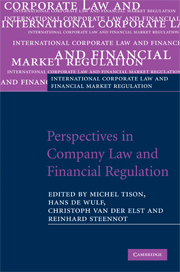Book contents
- Frontmatter
- Contents
- List of contributors
- Foreword
- PART I Perspectives in company law, SECTION 1: European company law: regulatory competition and free movement of companies
- PART 1 Perspectives in company law, SECTION 2: Corporate governance, shareholders' rights and auditing
- 9 Stakeholders and the legal theory of the corporation
- 10 The renaissance of organized shareholder representation in Europe
- 11 In search of a middle ground between the perceived excesses of US-style class actions and the generally ineffective collective action procedures in Europe
- 12 Some modest proposals to provide viable damages remedies for French investors
- 13 Pre-clearance in European accounting law – the right step?
- 14 International standards on auditing and their adoption in the EU: legal aspects and unsettled questions
- 15 Corporate governance: directors' duties, financial reporting and liability – remarks from a German perspective
- 16 Some aspects of capital maintenance law in the UK
- 17 Luxembourg company law – a total overhaul
- 18 Role of corporate governance reform and enforcement in the Netherlands
- PART 1 Perspectives in company law, SECTION 3: Takeover law
- PART II Perspectives in financial regulation, SECTION 1: European perspectives
- PART 2 Perspectives in financial regulation, SECTION 2: Transatlantic perspectives
- PART III Miscellaneous
- Index
- References
10 - The renaissance of organized shareholder representation in Europe
from PART 1 - Perspectives in company law, SECTION 2: Corporate governance, shareholders' rights and auditing
Published online by Cambridge University Press: 04 August 2010
- Frontmatter
- Contents
- List of contributors
- Foreword
- PART I Perspectives in company law, SECTION 1: European company law: regulatory competition and free movement of companies
- PART 1 Perspectives in company law, SECTION 2: Corporate governance, shareholders' rights and auditing
- 9 Stakeholders and the legal theory of the corporation
- 10 The renaissance of organized shareholder representation in Europe
- 11 In search of a middle ground between the perceived excesses of US-style class actions and the generally ineffective collective action procedures in Europe
- 12 Some modest proposals to provide viable damages remedies for French investors
- 13 Pre-clearance in European accounting law – the right step?
- 14 International standards on auditing and their adoption in the EU: legal aspects and unsettled questions
- 15 Corporate governance: directors' duties, financial reporting and liability – remarks from a German perspective
- 16 Some aspects of capital maintenance law in the UK
- 17 Luxembourg company law – a total overhaul
- 18 Role of corporate governance reform and enforcement in the Netherlands
- PART 1 Perspectives in company law, SECTION 3: Takeover law
- PART II Perspectives in financial regulation, SECTION 1: European perspectives
- PART 2 Perspectives in financial regulation, SECTION 2: Transatlantic perspectives
- PART III Miscellaneous
- Index
- References
Summary
Renaissance of shareholder voting rights and organized shareholder representation
Renaissance
When Eddy Wymeersch retires, like a good farmer, he leaves us with plenty of crops. Although this is of course not the last harvesting season, these years are certainly particularly rich years in his garden. They are years of a renaissance of shareholder voting rights in Europe and, very prominent among them, shareholder voting via organized shareholder representation. There are at least three reasons for making such a statement.
The first is that one of Wymeersch's core statements in his extensive input to the large stream of European and worldwide corporate governance debate has proven to be impressively right: he was one of the rather few who contributed to this debate in a truly international manner, based on the very extensive comparative law corpus, and who nevertheless did not succumb to the temptation to bet only on mechanisms of external corporate governance. Many of his writings on corporate governance – also early writings – could be summarized in short words as follows: despite the power of external corporate governance mechanisms, despite Wall Street rule and accounting law, ‘do not forget shareholder voting rights’. This is indeed the lesson to be learnt from the balance sheet scandals in the United States and then in various Member States. The more mechanisms of external corporate governance show their flaws, the more a combination of external and internal mechanisms of corporate governance becomes attractive – and voting rights are paramount in this respect.
- Type
- Chapter
- Information
- Perspectives in Company Law and Financial Regulation , pp. 183 - 199Publisher: Cambridge University PressPrint publication year: 2009
References
- 2
- Cited by



